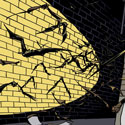
Batman Unauthorized
Edited by Denny O’Neil
BenBella Books, Inc

This July brings the latest, and perhaps most highly-anticipated, installment in the Batman movie franchise, Christopher Nolan’s The Dark Knight. There’s no better way to study up on The Dark Knight’s history than with Batman Unauthorized, edited by Denny O’Neil. The premiere writer of Batman comics in the 1970s, O’Neil is responsible for rebooting the Caped Crusader after his Pop Art TV days. O’Neil continued to write Batman comics and was the group editor for the Batman books until he retired in 2001.
O’Neil’s selection of 18 essays offers a complete picture of Batman in all his incarnations: his early resemblance to The Shadow when Bob Kane and Bill Finger debuted him in 1939; carrying a badge with the Gotham Police Department; the often forgotten ’50s space adventures; the loved and maligned 1966-1968 television series; a return to Batman’s dark origin in the ’70s (helmed by O’Neil); and the monumental comic books from the mid ’80s, The Dark Knight Returns and Batman: Year One, by Frank Miller. The essays also examine the respective successes and failures of the Tim Burton and Joel Schumacher films, Batman: The Animated Series of the ’90s, the odd Frank Miller Batman stories in the new millennium, and the most recently applauded addition to the mythos, Christopher Nolan’s 2005 film Batman Begins.
Covering Batman folklore from unique cultural angles, Batman Unauthorized could easily be listed on many syllabi when the 2008 fall college semester rolls around. Some of the essays are pure fun: Darren Hudson Hick calculates every expense involved in our hero’s legendary gear and training in “The Cost of Being Batman” and Chris Roberson wants to know “What’s Wrong with Bruce Wayne?,” taking a look at Batman’s traumatic origin and strange behavior. Author Kristine Kathryn Rusch wonders if the Dark Knight’s actions exhibit fascist tendencies in “Batman in the Real World.” “The Dubious Origins of the Batman” by Alan J. Porter explores the murky waters of authorship and the sad lack of credit given to co-creator Bill Finger.
Only two aspects of the Batman canon are missing: commentary on Batman’s foray into video games and the vast influence of the character’s merchandise on our culture. Video games now out-gross movies and the 2005 game Batman Begins features the voices of all the actors in new scenes and scenarios not in the movie. An essay about the new generation of kids experiencing Batman interactively would have been a valuable addition to the book. Batman Unauthorized does take a look at the brand of Batman, but not in much detail, and doesn’t spend much time on the cultural impact of the Batman logo, especially prevalent after Burton’s 1989 Batman film, when you couldn’t step outside without seeing a Batman logo t-shirt. Some mention of the millions of Batman toys stuffed in closets across the world would also have been worth exploring. Still, this book comes highly recommended, and the collection of essays is successful because the writers expertly and passionately present fresh ideas about the Dark Knight and highlight how he’s changed with the times – a perfectly imperfect hero for our society.
BenBella: http://benbellabooks.com/












